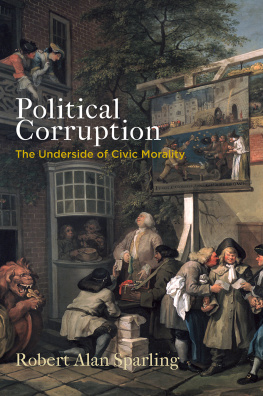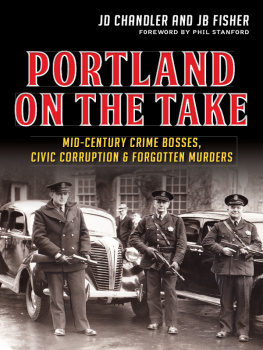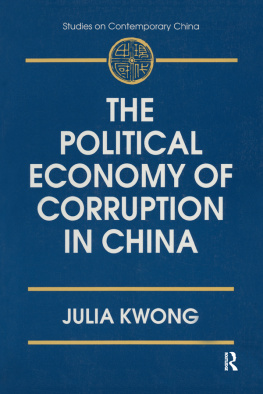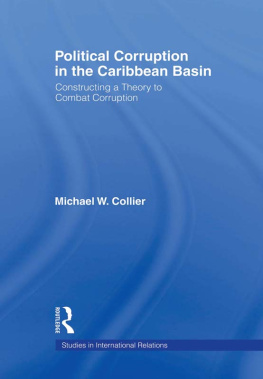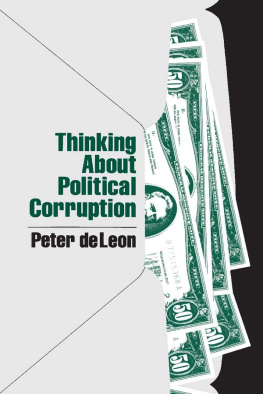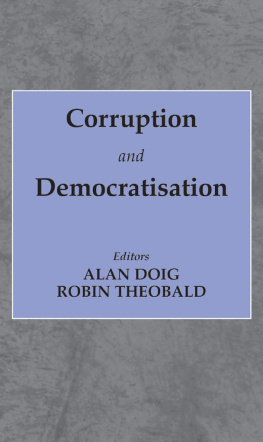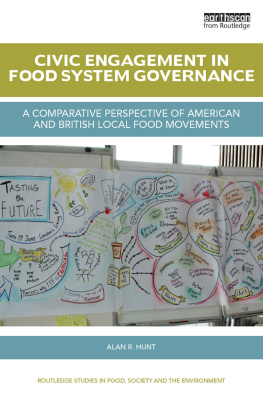Haney Foundation Series
A volume in the Haney Foundation Series,
established in 1961 with the generous support of Dr. John Louis Haney
Copyright 2019 University of Pennsylvania Press
All rights reserved.
Except for brief quotations used for purposes of review or scholarly citation, none of this book may be reproduced in any form by any means
without written permission from the publisher.
Published by
University of Pennsylvania Press
Philadelphia, Pennsylvania 19104-4112
www.upenn.edu/pennpress
Printed in the United States of America
on acid-free paper
1 3 5 7 9 10 8 6 4 2
Library of Congress Cataloging-in-Publication Data
ISBN 978-0-8122-5087-9

The study of political corruption has been beset with definitional disputes for some time now. While people periodically speak of corruption as if it had a fixed, unchanging meaning, scholars attempting to define the term with precision repeatedly stumble on the variety of significations it can have. The exact behaviors that are considered corrupt vary depending on historical, geographic, or cultural contexts. The purchase of offices was a regular practice in the ancien rgime; today it is frowned upon (or at the very least rebranded as a public-private partnership). Paying for a public service such as the service of a judge was once considered perfectly acceptable, but today we would balk at such user fees. Purchasing votes used to be widespread practice; now it can only be done through tax breaks and pork projects. Clashes between competing conceptions of corruption are not hard to find; they are particularly striking if one juxtaposes the mores of gift and market societies. And it is not merely between societies that such differences manifest themselvesthe dimensions of corruption are contested within societies themselves, with people exhibiting radically opposed views of what behaviors or attitudes constitute a breach of civic integrity. Nor is it an uncontested matter whether the term corruption refers to behavior, character, mores, beliefs; or whether the thing corrupted refers to a system (as in systemic corruption) or to the behavior or character of an individual or a group.
There are, to be sure, important commonalities that one can discern across history and geography. In many states where the conspicuous prevalence of bribery, nepotism, and clientelism might lead one to suspect that different attitudes toward these behaviors obtained, one finds that the populations nonetheless widely term these behaviors corrupt and express views quite consistent with those in countries where people rarely
There is currently a small but growing literature of a philosophical nature on the subject of corruptions precise definition. Warrens work has attempted to define corruption in terms of the norms of democratic theory; Seumas Miller has sought a wide definition of institutional corruption capturing the great variety of abuses that come under that name. Others such as Lawrence Lessig and Zephyr Teachout have sought a definition anchored in the republican tradition of the American founding. Others yet have attempted to define the concept as a breach of impartiality, drawing on liberal political theorists such as Brian Barry. Without entering into a detailed examination of these important contributions here (we will visit some of them in the course of our study), let us merely note that in spite of these laudable efforts, the philosophical study of corruptions meaning remains relatively marginal in both the field of corruption studies and in political theory. In a recent survey of this debate, Mark Philp and Elizabeth Dvid-Barrett lament that the absence of significant reflection in political theory on the nature, forms, and sources of corruption is a serious failing of the subdiscipline.
While there are some notable exceptions, If this is the case (and, while we will have cause to revise many of Pococks arguments, we may agree with his general claim about the centrality of corruption discourse in the Atlantic tradition), then the absence of corruption as a central matter of concern for political theorists today should give us pause. How could a concept so central to both contemporary public discourse and to our political-philosophical tradition have such little space in political theory today?
If political theorists have in the main not been focused upon the question, the more practically minded students of corruption have tended to downplay the philosophical problems entailed by the term. A great deal of literature begins by recognizing definitional difficulties, but attempts to settle these questions quickly in order to fix on a definition that can serve as a tool for social-scientific advancement and legislative action. Arvind Jain, for instance, writes, Although it is difficult to agree on a precise definition, there is consensus that corruption refers to acts in which the power of public office is used for personal gain in a manner that contravenes the rules of the game. No doubt some discussion of corruption slips into sermonizingthat is a danger in all moral discoursebut there is, in the social-scientific wariness of moral categories, a greater danger of slipping into moral inarticulacy. From the perspective of economics, there is doubtless much to be gained by eschewing moral discussion in favor of measuring things like illicit transfers of wealth. But whatever progress this bracketing of moral matters permits the economists to make (and it is not negligible), it can be harmful if it is allowed to substitute for the task of ethical and political philosophy, for it closes off avenues of discussion and, indeed, eliminates from consideration entire traditions of thought (among which are traditions in which the very normative assumptions of modern economics would themselves be considered corrupting). The discourse of political corruption bears a heavy normative load, notwithstanding the persistence of scientific attempts to keep values from contaminating facts.
I wish neither to condemn the social scientists desire to delimit their realm of inquiry nor to castigate practically minded reformers seeking a toolkit suitable to their task, but rather to indicate that political theory must proceed in a different manner. And the concept of corruption in particular merits sustained normative reflection, for it is of much greater significance than is often recognized. The concept of political corruption is fundamentally an expression of political morality; to denounce corruption is to affirm some vision of integrity, wholeness, or political health. In an important 1997 article, Mark Philp made the straightforward observation that one line definitions of political corruption are inherently misleading because they obscure the extent to which the concept is rooted in ways of thinking about politicsthat is, of there being some naturally sound condition (variously described) from which corrupt acts deviate.
Perhaps this derives from the fact that serious inquiry on the meaning of corruption opens up a vast field of contested political questions. For corruption is a negative concept, one structured by its opposite, the positive conception of healthy political relationships. To inquire into the term is to question our own politico-moral ideals. Corruption discourse often has the effect (and possibly even the purpose) of displacing politics because it attempts to police relations between citizens and their institutions while taking as given the very contours of a healthy polity. To explore the nature of corruption is to open up to questioning those very contours.





